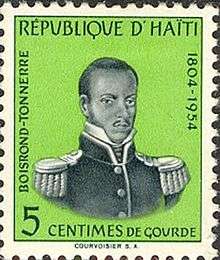Boisrond-Tonnerre

Louis Félix Mathurin Boisrond-Tonnerre (born 6 June 1776; executed 24 October 1806), better known as simply Boisrond-Tonnerre, was a Haitian writer and historian who is best known for having served as Jean-Jacques Dessalines' secretary. Boisrond-Tonnerre was educated in Paris until 179,8 when he returned to Haiti (Daut 56). He is the author of the 1804 Independence Act of Haiti, which formally declared Haiti's independence from the colonial rule of France. He is also known for his work chronicling the Haitian Revolution, Mémoires pour Servir à l'Histoire d'Haïti.
Boisrond-Tonnerre was born Louis Boisrond in Torbeck in southwest Haiti. He acquired the name "Tonnerre", French for "thunder", as an infant when his cradle was hit by lightning. His father, a carpenter named Mathurin Boisrond (see Daut below), amazed that his infant son was unharmed, gave him the name "Tonnerre". Boisrond-Tonnerre studied in France before returning to Haiti, where he took part in the Haitian Revolution. A supporter and secretary of the revolutionary general Jean-Jacques Dessalines, Boisrond-Tonnerre supported the 1804 Haiti massacre of all whites remaining on the post-revolutionary island. Voicing his support, Boisrond-Tonnerre stated, "For our declaration of independence, we should have the skin of a white man for parchment, his skull for an inkwell, his blood for ink, and a bayonet for a pen!"
However, Boisront-Tonnerre became a victim of post-revolutionary infighting and was executed in October 1806. According to the Haitian author Christophe Phillippe Charles, Boisrond-Tonnerre scribbled the following quatrain on the walls of his cell before his execution on either the night of 23 or 24 October 1806:
Humide et froid séjour fait par et pour le crime
Où le crime en riant immole sa victime
Que peuvent inspirer tes fers et tes barreaux
Quand un coeur pur y goûte un innocent repos? (Christophe 35).
Translation :
Cold and humid internment crime has both fashioned and formed
Where crime, laughing, immolates and consumes its servant
But what [fear] can your iron bars hope to inspire
When a pure heart wrests from them a peaceful rest? (Christophe 35)
References
- Schutt-Ainé, Patricia (1994). Haiti: A Basic Reference Book. Miami, Florida: Librairie Au Service de la Culture. p. 90. ISBN 0-9638599-0-0.
- Daut, Marlene. "Un-Silencing the Past: Boisrond-Tonnerre, Vastey, and the Re-Writing of the Haitian Revolution." South Atlantic Review 74.1 (2009): 35-64.
- Charles, Christophe Phillippe. Panorama de la Littérature Haïtenne de 1804 à 2004, Tome 1. Port-au-Prince: Editions Choucoune, 2003.
External links
- The Louverture Project: Louis Boisrond Tonnerre